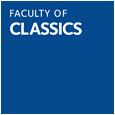Professor Gregory Hutchinson
I was born in 1957, in Hackney, London. I went to the City of London School (with an Inner London Education Authority free place). I went to Balliol College, Oxford, as an undergraduate and graduate, then to Christ Church, Oxford, as a Research Lecturer. In 1984 I became Fellow and Tutor in Classics at Exeter College, Oxford, and in 1998 Professor of Greek and Latin Languages and Literature. In 2015, I was appointed to the Regius Chair of Greek, and so returned to Christ Church, having really seen the world.
I flit about between Greek and Latin, poetry and prose, and between commentaries and other sorts of book, some of which experiment with the possibilities of the commentary format and approach. I like to combine detailed textual work with larger literary argument, and to explore the relation of literature to history, archaeology, and other areas. I’ve written commentaries on Aeschylus, Polybius (forthcoming), Propertius, and Greek lyric poetry; and books on poetry in the third century BC and Latin literature in the ‘long’ 1st century AD, on Cicero’s letters, on Greek prose-rhythm, on poetry-books, on the Latin use of Greek literature, and on motion in classical literature. I’m now at work—somehow or other—on an Oxford Classical Text of Polybius and accompanying volumes.
Homer, Greek and Latin lyric, Greek tragedy, Hellenistic poetry, Hellenistic prose, esp. Polybius, Cicero, Latin elegy, ‘Silver’ Latin, Imperial Greek prose, epistolography, historiography, prose-rhythm.
Full Publications: Professor G.O. Hutchinson Publications October 2025
Selected Publications:
I’ve had the privilege of supervising numerous doctoral and Master’s students on a range of subjects. A good few have turned their doctoral theses into important books (so W. Allan, The Andromache and Euripidean Tragedy (2000), P. Finglass, Sophocles, Electra (2007), R. Parkes, Statius, Thebaid 4 (2012), H. Spelman, Pindar and the Poetics of Permanence (2018)). Recurring areas have included Hellenistic poetry and Cicero; recent and present subjects include fragments of Hellenistic rhetoric, Graeco-Roman ‘publication’, commentaries on papyrus, and alchemical literature. Recent Master's dissertations have included one on women’s names in Horace and one on representations of Eros and the eromenos.—But now that I’ve retired, I’m attempting to teach myself.




